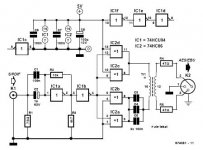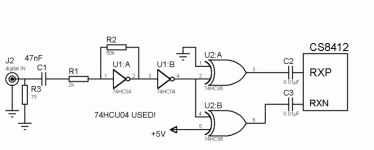janneman said:
The input signal is around .7V pk-pk, which gets at the primary of the input xformer. The input of TXR and TXP is also .7V pk-pk, of course.
The xformer floats, and the TXN is just a few 10's of mV wrt ground (and also at around 100mV DC wrt ground).
Is this normal? I'll check the recommended level for the 8420. Are you guys saying this input circuit is a klutz, really??
Jan Didden
0.7v is a fraction of what the AES/EBU spec calls for. Thats barely enough to pull the skin off a bowl of custard. Before anything else, try driving the input with something with a bit more drive.
rfbrw said:You could try boosting the input with a SN75176 or something similar. There is also a TTL circuit based around the 74HCU04 and the 74HC86 you could try. Both options give a balanced output a lot higher than 0.5 volts
Like this?
This says it all:
AES/EBU S/PDIF (IEC-958)
Cabling 110 ohm shielded TP 75 ohm coaxial or fiber
Connector 3-pin XLR RCA (or BNC)
Signal level 3..10V 0.5..1V
Modulation biphase-mark-code biphase-mark-code
Subcode information ASCII ID text SCMS copy protection info
Max. Resolution 24 bits 20 bits (24 bit optional)
Jan Didden
Attachments
rfbrw said:Pretty much the same thing I was referring to.
I would prefer your solution as it does away with the transformer
Jan Didden
I can't claim it as my solution as it has been languishing in the forum for a year or two now. As you already have a transformer in the DCX it might be easier just to add the extra components and use the existing supply. At the moment it is still a case of establishing whether this is the cause of your problem so something rough and ready will probably do.
There's nothing wrong with the Behringer implementation - you just have to bear in mind that it's a piece of professional kit that expects professional levels. Rather than modify its input, why not modify the CD player's output? Most have an optical output that isn't used. Why not pick up the input to the optical transmitter at logic level and fit your AES3 driver at that point? (Together with a nice XLR.) The transformer is recommended to avoid RF noise circulating around the earths in your system.
rfbrw said:Modifying the player is a good idea in its own right but I would make sure that the low output associated with SPDIF is indeed the problem. A simple booster on a bit of veroboard should do the trick.
Yeah. What I thought, why not just replace the input xformer in the Behringer (or add one in front). This is a 1:1, it seems to me if indeed this is the problem, a 1:2 would do it. Maybe I'll just hang a 1:2 on the Behringer input
Interestingly, this weekend the DCX that still works stopped working all of a sudden two times, same symptoms. After a switch off and then on again all was fine.
I tried the non-functioning one with two diferent CD players, no difference.
Am I the only one having this???
Jan Didden
You then run the risk of overdriving the input should you ever use something with a proper AES/EBU output. Should a low SPDIF output prove be a problem it would be best to either modify the player or for greater flexibilty in your choice of sources, build a powered spdif to AES/EBU adaptor.
I've found the Behringer to be a reliable unit in the six years it has been in my tri-amped system. The two problems it developed were easily fixed. The digital input (A) stopped accepting a signal, and the unit developed some occasional crackling sounds. The solution to both problems was the same --- clean the black connectors on the large, central circuit board.
I did this by prying loose the blobs of glue securing the connectors from the circuit board (they are impossible to cut with a blade) and cautiously unplugging and replugging the connector so as not to damage the board in which they are mounted.
The other ends of the flat, grey, multistrand wires also have black connectors mounted unto smaller, peripheral boards, but don't try to remove them. They are hard wired.
I did this by prying loose the blobs of glue securing the connectors from the circuit board (they are impossible to cut with a blade) and cautiously unplugging and replugging the connector so as not to damage the board in which they are mounted.
The other ends of the flat, grey, multistrand wires also have black connectors mounted unto smaller, peripheral boards, but don't try to remove them. They are hard wired.
- Status
- This old topic is closed. If you want to reopen this topic, contact a moderator using the "Report Post" button.
- Home
- Source & Line
- Digital Line Level
- Problem with Behringer DCX2496

